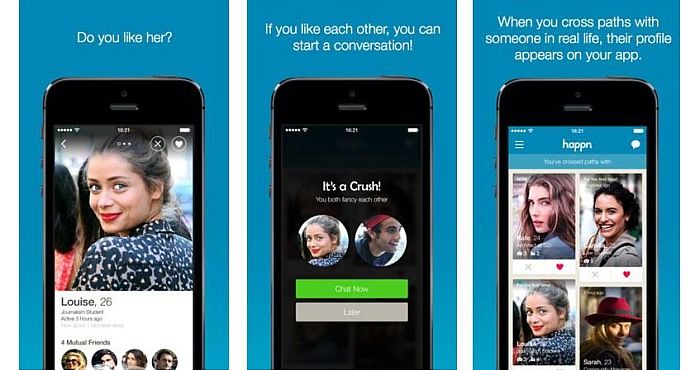Best Dating Apps No Fake Profiles
Zoosk is more suitable for a young audience. This one of the Best Free Dating Sites is not as serious as eHarmony, and it does not offer to answer to so many questions. It pays attention at the people whose photos you like and then selects a suitable match, basing on your preferences. The Best Dating Apps for 2021. Whether you're looking for a casual hookup, a serious relationship, or even a marriage, we've tested all the major competitors so you don't have to waste time you. Features for introverts: Anomo is 100% about keeping things casual, at least at first, giving you time to feel out the situation. Unlike other dating apps out there, Anomo starts you off with just.
Guys looking for a little action should check out the free dating sites and apps out there. While the free apps and sites are not 100% legit, they can provide a great place to meet people, and if they are legit and legitimate, you’ll be set for a happy and fulfilling life. These dating sites aren’t just for women either.
Chances are you've landed on a fake dating profile or two over the course of your online dating career. They look a lot like real profiles with real, bonafide people behind the screen. But because they're created by catfishers and scammers, they often have a few qualities that scream 'fake,' once you know what to look for.
About 10% of dating profiles fall into this category, so it's good to know the red flags, especially if you spend a lot of time swiping and scrolling through all your matches. 'A fake profile is anywhere the person is misrepresenting their true identity,' Jonathan Bennett, a relationship and dating expert at Double Trust Dating, tells Bustle. Fake profiles are created for a variety of reasons, he says, including catfishing for attention, marketing products, or even scamming people out of money.

The whole reason they work is because they look legit. But according to DatingScout, you can often tell what's real from what isn't by looking at the photos. If the profile only has one or two pictures, consider it a red flag. And the same is true if the photo is one with a white background, as that could indicate it's a stock image yanked from the internet, and not actually them.
Should you spot one of these telltale signs, take a beat and examine the rest of the profile. 'If a person seems too perfect, it's a red flag you could be dealing with a fake,' Bennett says. This might mean they have extremely professional looking photos, he says, versus ones where they're just casually hanging out with friends or family. Or that they're bragging a bit about things like wealth and status, which could be a ploy to lure unsuspecting daters in.
Of course, it's not just people making these profiles, but computer programs. 'If the wording and grammar on the profile seem off ... it is a sign you could be dealing with a fake or a bot,' Bennett says. These profiles are created with the goal of scamming you into sharing private information, as mentioned above, or tricking you into clicking on malware links.
If someone's profile answers seem all weird, disjointed, and robotic, don't bother engaging. And the same goes for profiles that seem like they're trying to sell you something, which is more common than you might think. 'If the profile is focused on sending you elsewhere to contact the person in the profile, like a website, it's likely a fake trying to scam you or market to you,' Bennett says.
The ultimate test, though, is seeing if they'd be willing to hop on FaceTime or meet up with you in person, Emily Pfannenstiel, LPC, a licensed professional counselor who specializes in relationships, tells Bustle. 'If you are speaking on a dating site,' she says, 'the assumption is that you are planning to meet up and go on a date at some point.' So you'll definitely want to back away and move on, if they refuse.
Another way to ensure you're chatting with a real human, and one who wants to go on a genuine date just like you, is by checking to see if they've included their social media pages. 'Many dating profiles allow linking to social media,' Bennett says, since it can serve as further verification.
Even though you should be focused on meeting new people and having fun conversations, online dating is all about keeping an eye out for these red flags, too. You obviously won't want to click on random links or wire money to strangers, and you won't want to chat with folks who have stock images for profile photos, either. Look for social media links along with real photos and human-sounding info in profiles. And if something seems off, trust your gut.
'If you're pretty sure the person is a fake, then I would recommend reporting them using whatever mechanism is available,' Bennett says. 'Scammers, marketers, and other fakes take away from the true purpose of dating apps and make finding love that much harder.' You can also choose not to engage in a conversation if something seems strange, and instead save all that energy for the real folks who have good intentions.

Once you feel the conversation is rolling, and you'd like to see who is on the other end, it can also help to plan a date. 'This way, you can know right away if the person is who they say they are (if they aren't, they'll be likely to not follow through), and if you like them and want to date them in the first place anyway,' Pfannenstiel says. 'So set up that date early on and you will be less likely to be catfished,' and way more likely to find a great partner.
Experts:
Jonathan Bennett, relationship and dating expert at Double Trust Dating
Emily Pfannenstiel, LPC, licensed professional counselor
More than half of online dating app and website users believe they’ve seen a fake profile with two in five having been approached by someone asking for money.
The Which? survey of 1,000 users of online dating services also found that one in seven admitted to sending money to someone who had asked for it.
Of those who sent money, men were twice as likely to have parted with cash when asked to than women.
Usage of dating website and apps is on the rise, which means that potential for fraud is also rising.
Online dating fraud has cost victims £27 million collectively over the last year, according to police figures.. Use our advice to spot fake online dating profiles and to protect yourself when using dating sites and apps.
Some dating services riskier than others
Of the dating sites used by those surveyed, users of Lovestruck.com were more likely to be asked for cash with more than a third reporting they’d been approached for money while using the site.
Almost three in ten users of Dating Direct and Elite Singles also reported that they’d been approached for money while on these sites.
Fake profiles rife on sites and apps

The Which? survey also found that around six in ten people had seen what they believed to be a fake profile.
Tinder was revealed to be the dating app where most people thought they had encountered a fake profile, closely followed by Plenty of Fish and Lovestruck.com.
But only three in ten said they reported fake profiles when they saw one.
Which? director of campaigns Alex Neill said: ‘It’s important for people to be vigilant when using dating sites or apps and ensure they are not revealing personal data that then could be used by scammers.
‘We’ve found most dating sites are quick to act on reports of fake profiles and scam attempts, so we encourage anyone who sees a fake profile or is approached by a suspected scammer to report it.’
‘I lost £4,000 to a dating scam’
During this investigation, Which? heard from Deborah*, who reported that she’d lost £4,000 to a dating scam last year in what she described as a ‘horrid situation’ that caused considerable distress.
Deborah met Steven while using Encounters Dating. He presented himself as a business consultant working in the oil industry who was often out of the country.
After a few weeks of regularly speaking through online messaging, email and a couple of telephone calls, they arranged to meet.
A matter of hours before the couple were due to meet face to face for the first time, Steven messaged Deborah to say he was out of the country and in desperate need of cash to fulfil a business contract.
The persistence of dating scammers
Deborah initially refused to send money, insisting that Steven must know someone else who could help. Steven pushed harder, becoming frantic and desperate saying she was the only one who could.
Despite her misgivings, Deborah succumbed to the pleas of a man with whom she believed she shared a mutual affection and transferred the funds to Steven.
Shortly after making the transfer, Deborah confided her concerns in a friend who warned her this could be a scam. Despite making several attempts to stop the payment, it went through.
Deborah’s bank said it had no reason to stop the payment – she had authorised it.
After reporting the scam to the dating site, the offending profile was immediately removed, but Deborah was still left £4,000 out of pocket.
Top tips on dating apps and websites
Users of online dating websites need to be alert to the potential for fraudulent activity. To guard yourself against being scammed, follow our tips:
- Money Don’t send money to anyone you meet through an online dating website, no matter how convincing they may appear to be
- Unique email Always create and use a unique email address that is different to your personal or professional addresses when setting up a profile
- Personal details Don’t share personal details such as your mother’s maiden name or pet’s name which could be used to try to access financial information
- Real name Don’t include your last name, email or home address or any identifying information in your profile
*Please note that names and some minor details have been changed to preserve anonymity.
Dating App Profile Picture
Best Dating Apps No Fake Profiles Online
- Find out more about the latest scams
- Use our advice to get your money back after a scam
- Follow our step by step guide to report a scam